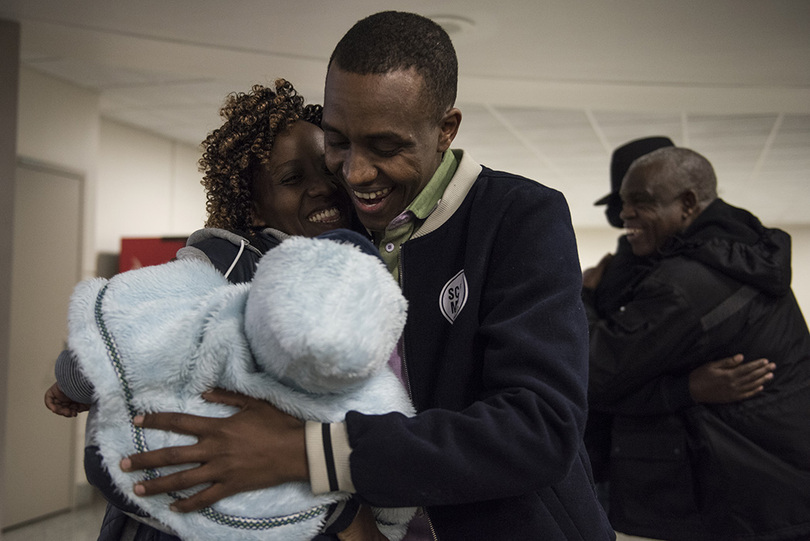President Donald Trump’s first travel ban barred refugees from entering the country for 120 days. In early February, the 9th U.S. Circuit Court of Appeals blocked enforcement of the travel ban, upholding an earlier decision made by a federal judge in Seattle. An attempt at implementing a similar ban was stopped in mid-March by two separate appeals courts.
Several workers from Syracuse Interfaith Works of Central New York, a nonprofit that resettles refugees, have been laid off since the first travel ban. But Felicien Seruhungu, who has worked for Interfaith for a few years, survived the cuts.
On this night in late February, Seruhungu is picking up a family of three from the Democratic Republic of Congo. It’s a special pickup — one where he gets to reunite with his cousins.
In 2009, Seruhungu and his wife walked through those futuristic doors at the airport as refugees from the Congo. But the America he found beyond those doors wasn’t the America he was promised.
“The way people feel about this country; They think paradise,” said Seruhungu. “But when they get here; A different reality.”
The cultural and educational barriers are often glazed over during the talks of coming to America — mostly out of necessity. It creates a false reality, but real hope.
Seruhungu smiles as he drives north past Destiny USA, and says he enjoys taking his kids to the mall on the weekends to hang out or see a movie. His three kids were born in America, are doing well at school and, most importantly, are living in peace.
Peace and safety seemed like an abstract concept before he moved to the states. His family fled the Congo to escape a war almost as bloody as World War II. But even a United Nations protected camp in a neighboring country didn’t offer the peaceful refuge he sought. In 2007, a warring tribe killed his mother while she was staying there.
For most of the night, Seruhungu talks slowly, sorting through the language barrier with precision and consciousness. But his carefully chosen words smash together and his accent grows heavier when talking about Donald Trump’s campaign slogan, “Make America Great Again,” and recent layoffs at his work.
“He want to make this country great, but this has been great. This is as a great as it gets,” he said. “This is a great nation, so when he says, ‘I want to make this nation a great again.’ This is a great nation, what is he think?”
Seruhungu shakes his head, takes a deep breath and continues.
“This is a country of immigrants, I am sure he is from somewhere else. If not for him, a parent or grandparent they came from somewhere else. Refugees don’t get come here for just benefits, we work, we pay taxes to the government. Yes, yes, yes, this country is already great,” Seruhungu said.









